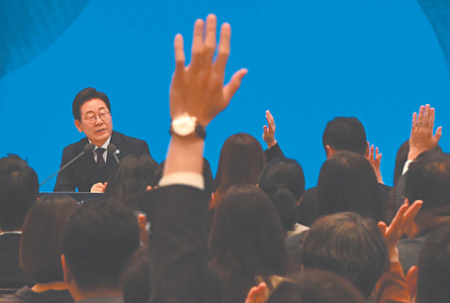
In a significant foreign policy recalibration for a key U.S. ally, South Korea’s new President Lee Jae-myung has announced his intention to improve relations with both Russia and China. Speaking at a press conference just 30 days into his term, the left-liberal leader declared a new era of “pragmatic diplomacy focused on national interests,” marking a distinct departure from his predecessor’s staunchly pro-Washington stance and signaling a potential shake-up in the region’s geopolitical dynamics.
The new administration’s approach contrasts sharply with that of former President Yoon Suk Yeol, under whom Seoul’s relations with Moscow hit a low point. The previous government aligned with the West in sanctioning Russia over the conflict in Ukraine and was deeply alarmed by the burgeoning strategic partnership between Moscow and North Korea. However, even under U.S. pressure, Yoon’s administration stopped short of providing lethal aid to Kyiv. President Lee’s overture suggests a desire to carve out a more independent foreign policy, balancing traditional alliances with national economic and security imperatives.
This diplomatic shift is occurring alongside a major reset in inter-Korean relations. President Lee confirmed his commitment to resuming dialogue with North Korea, effectively reversing the hardline policy of the previous conservative government which had ceased all forms of cooperation. Early actions, such as halting propaganda loudspeaker broadcasts across the border—a move reciprocated by Pyongyang—and cracking down on activists sending anti-regime leaflets, indicate a potential revival of the “Sunshine Policy” of engagement and economic cooperation from the late 1990s and early 2000s.
Personnel appointments are further fueling speculation of a genuine pivot. President Lee has named Wi Sung-lac, who served as South Korea’s ambassador to Russia from 2011 to 2015, as his new National Security Director. This move places a seasoned Russia hand at the center of his foreign policy team. Concurrently, the current ambassador in Moscow is being replaced after a relatively short tenure of less than two years, suggesting an urgency to install a representative more aligned with the new administration’s vision.
However, analysts advise a cautious approach, waiting for concrete actions to follow the rhetoric. Konstantin Asmolov, a leading researcher at the Russian Academy of Sciences’ Institute of China and Contemporary Asia, noted that Lee is known for his populist style and that his promises must be measured by his deeds. Key indicators to watch, according to Asmolov, will be the profile of the next ambassador sent to Moscow and whether the new government takes steps to curb anti-Russian activities within South Korea. The coming months will reveal whether this is a cosmetic adjustment or a fundamental strategic realignment for Seoul.
